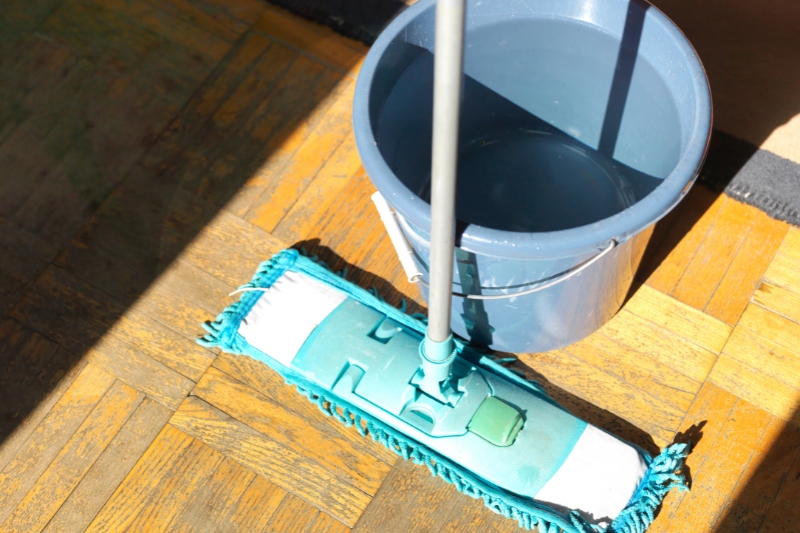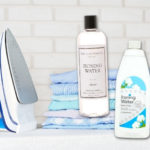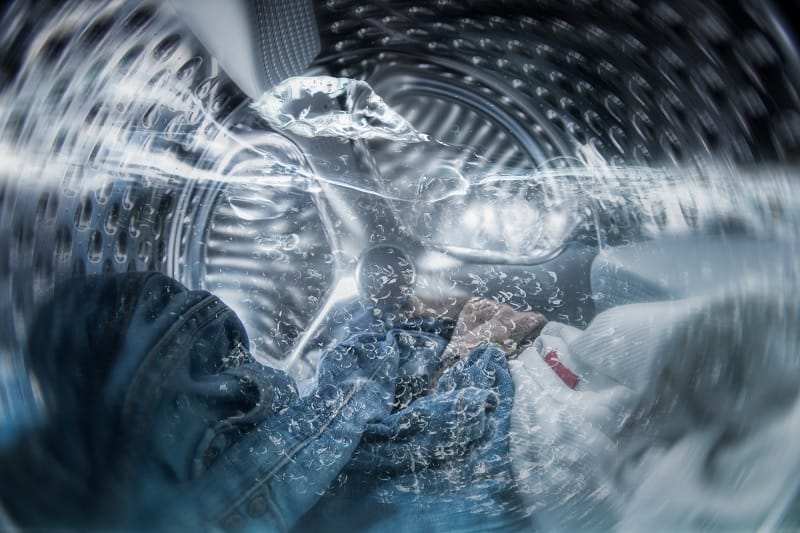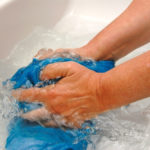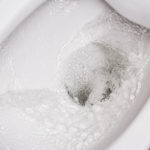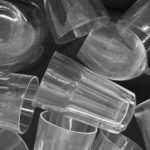Not interested in using an expensive off-the-shelf floor cleaner to mop your floors?
Or perhaps your mother-in-law just phoned to say she’s popping around, and you need to wash the kitchen floor at lightning speed, but you’ve run out of cleaner!
Whatever your dilemma might be, there’s one burning question you’ve got to find an answer to: can you mop floors with just water?
You’ll be pleased to hear that, yes, you can mop most floors with just water. However, before you attempt to do this you’ve got to make sure that your floor can be cleaned with water first and foremost.
Believe it or not, there are a few types of flooring that cannot be cleaned with liquids, so you better not get them wet!
In addition to this, it’s generally fine to clean floors with just water, if the surfaces in question are only slightly dirty (a bit of dust or some light soiling).
It would, however, be unwise to try and clean floors that are obviously caked in weeks of dirt and bacteria with just water!
If you attempted to wash an extremely grotty floor with water, it’s highly unlikely that water alone would be able to dislodge/remove the aged dirt. And the floor certainly wouldn’t be bacteria-free and hygienic by the end of the mopping session.
Let’s learn more about cleaning floors with just water below.
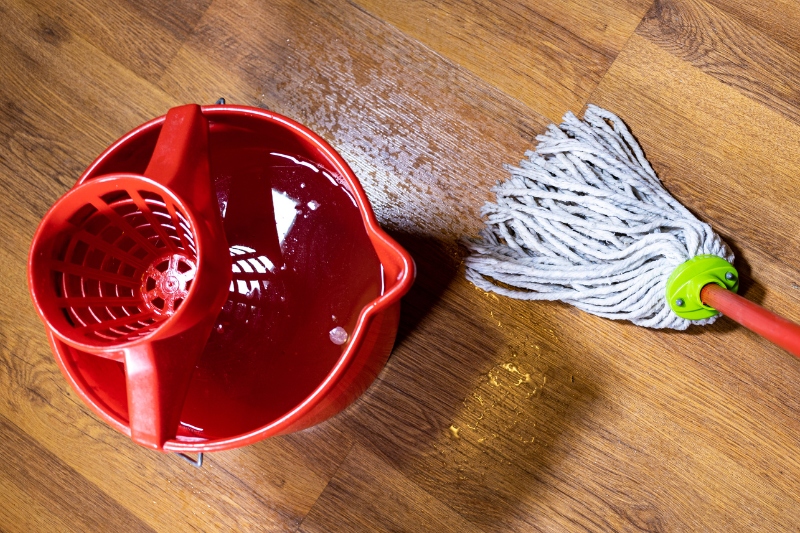
Can You Clean Floors with Just Water?
It is possible to clean certain floors with just water. And this is a generally cost-effective and natural way of cleaning a surface. And provided that the floor isn’t absolutely stinking dirty, a quick mopping should bring the flooring up nicely!
Nonetheless, you should keep in mind that not all floors should come into direct contact with lashings of water.
In general, you should make sure that you use a damp mop to clean floors, rather than an absolutely saturated one!
Using a damp mop also makes the cleaning process a tad safer because you’re not going to be leaving pools of water all over the place that you, or another family, could slip on.
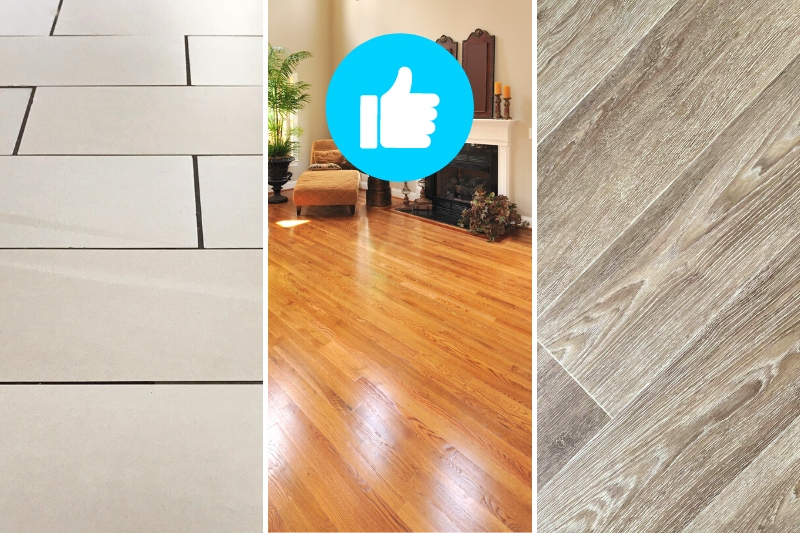
Floor types you can clean with water
Here are some examples of floors that can be cleaned with water:
- Tiled – Tiled floors, like the ones found in kitchens and bathrooms, can be cleaned with pure water if need be. But do make sure that you don’t oversaturate the mop head as the floor can become extremely slippery when it’s got liquid all over it. And given that these tiles are normally used in high-traffic areas, by using less water the floor should dry quicker, which would make it safer for family members to walk on as a bonus.
- Sealed hardwood – Sealed hardwood floors can be mopped with just water, but as mentioned above, the mop needs to be wrung out properly before it makes contact with the floor. Essentially, very little water should get onto the hardwood.
- Vinyl – Vinyl flooring is a water-resistant kind of flooring, so it can be washed down with a mop and some plain water.
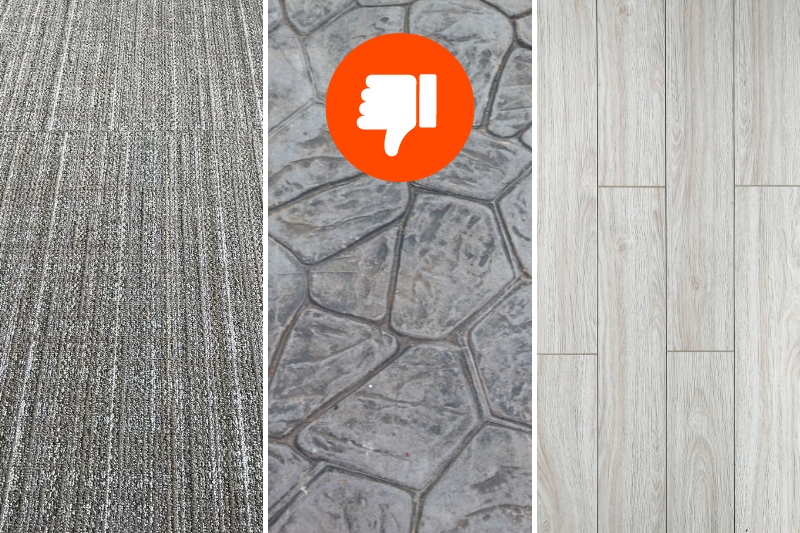
Floor types you can’t clean with water
In contrast, here are some examples of floors that cannot be cleaned with water:
- Carpets – Carpeted floors should not be cleaned with water as the liquid can damage the carpet’s fibres, and the underlay/floorboards underneath the carpet. If you do need to use water to treat a stain, you need to keep the area well-ventilated so the carpet dries, and you should only use a small amount of liquid. But, in general, you should use a carpet cleaner to clean a carpet.
- Stone – Stone floors, like sandstone, can be porous which means they can absorb water. It’s for this reason that you should only clean these kinds of floors with official cleaners.
- Laminate – Laminate floors shouldn’t really get wet because they’re not waterproof. If laminate flooring is exposed to too much water it can absorb the liquid and the boards can become warped. It’s better if you stick to an official cleaner if you’ve got these kinds of floors throughout your home.
Further to this, the type of dirt you’ve got on your floors is also going to play a role in whether or not you can mop the floor in question with just water, or if you’ll need to use an actual detergent.
If you need to clean a high-traffic area, say the hallway or kitchen, it’s very likely that you’ll need to use a bit more than just water to clean these areas properly.
These surfaces will be caked in different types of dirt, some of which will be hard to remove, which is why you might need to use a floor cleaner to break down and wash away the grime.
For example, if you’ve dropped bits of food, sauce and oil onto the kitchen floor, a mop and a bit of water might not be able to remove this debris for you.
You might end up just mopping the dirt around the room, and making the problem worse by staining more of your floor. In this case, it would be better if you used a bit of kitchen roll to gather up the grime, then cleaned the floor with an official cleaner, so the floor ends up being bacteria-free and hygienic!
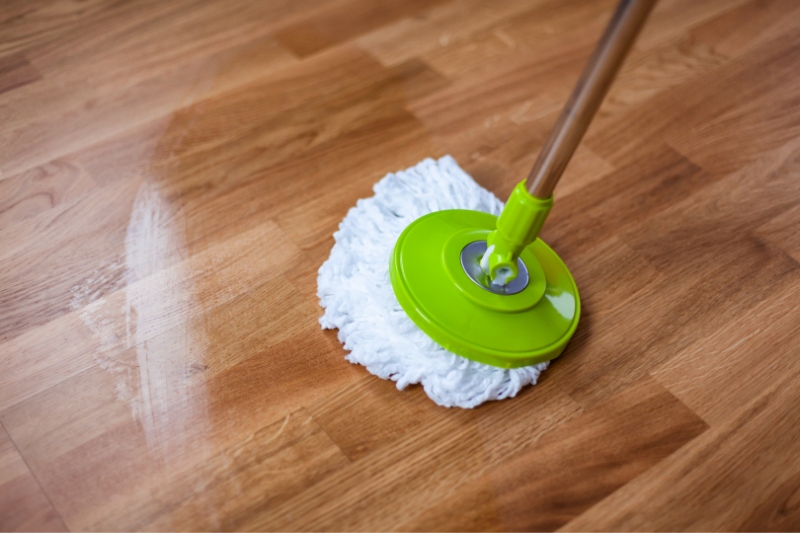
Benefits of just using water to mop floors
Here are some benefits of using just water to clean floors:
- No harmful chemicals at play!
- It’s greener to just mop with fresh water.
- It’s a relatively cost-effective approach.
- It’s safe to have around young family members and pets.
- It’s a fairly quick and straightforward cleaning method.
Downsides to just using water to mop floors
Here are some drawbacks of using just water to clean floors:
- Not likely to be effective when trying to clean high-traffic areas that are continuously exposed to all manners of dirt.
- Will not remove bacteria from floors.
- Cannot remove stains.
- If you cannot clean the floor effectively with just water, you might end up just mopping the dirt around the surface. In turn, the entire floor could look grotty and blemished.
- If you don’t control the amount of water you use, you could seriously damage your flooring.
- Water cannot be used on all types of floors. To clean certain floors, you should invest in a specialised cleaner. For example, an official laminate floor cleaner for laminate surfaces.
Water alone can be used to mop floors, but you’ve got to make sure that the floors you want to wash can be cleaned with water beforehand.
Additionally, it might be better if you only cleaned slightly dirty floors with plain water, because it’s unlikely that water alone is going to budge the grime off extra grotty surfaces.
In order to clean a floor correctly and to remove as much dirt from the surface, you need to use some kind of floor cleaner.
Of course, what cleaner you use depends on the type of floor you want to clean. Generally, if you add a bit of soap to the floor it’ll end up looking fresher and will be more hygienic.
Can You Mop with Just Boiling Water?
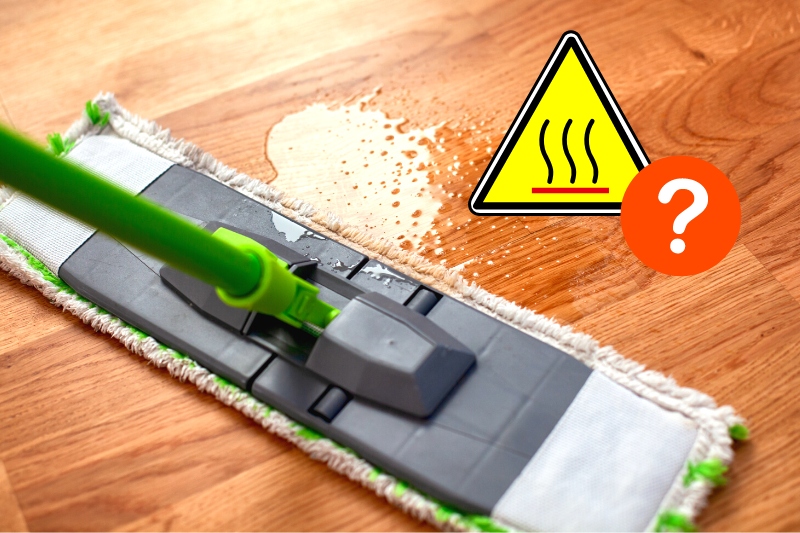
Some online hacks tell you to use hot water to clean floors because it’ll wash away the dirt and clean your floors properly. But this isn’t actually the case.
In fact, you’ve got to be careful about what temperature of water you use to clean your flooring.
Boiling hot water, for example, can damage some floors by warping them, aggravating the adhesive underneath the surface, weakening the material, and in the worst case, discolouring patches of flooring.
Also, if you’re trying to mop up a greasy substance from a floor, adding hot water to it can make it more difficult to clear away. The hot water helps to spread the greasy debris, and as you mop the mess up, you essentially end up spreading it all over the floor instead.
It is better to err on the side of caution when it comes to cleaning floors, and to mop surfaces with cold or lukewarm water. In addition to this, you should always do a patch test with the water before you use it to clean a surface properly.
Not all surfaces react well when exposed to liquid, so this simple test could save you from ruining your floor!

Bethan has a passion for exploring, reading, cooking and gardening! When she’s not creating culinary delights for her family, she’s concocting potions to keep her house clean!
